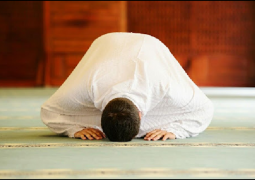
There are a number of hadith that state the virtues of observing the sunnah prayer at dawn time. For example: ‘Aishah relates that the Prophet sallallahu alehi wasallam said about the two rak’at before the fajr “They are dearer to me than the whole world.” This is related by Ahmad, Muslim, and at-Tirmizhi.
Abu Hurairah reports that the Prophet said: “Do not leave the two rak’at of the fajr, even if you are being attacked by a cavalry.” This is confirmed by Ahmad, Abu Dawud, al-Baihaqi, and at-Tahawi. The message of the hadith is that one should not leave the two rak’at of the fajr no matter what the excuse, even while under enemy attack or under most trying conditions. ‘Aishah says: “The Messenger of Allah was not so particular about observing any supererogatory prayer as he was in observing the two rak’at before salatul fajr.” This is related by al-Bukhari, Muslim, Ahmad, and Abu Dawud. She also reports that the Prophet said: “The two rak’at of the fajr are better than this world and all it contains.” This is reported by Ahmad, Muslim, at-Tirmizhi, and an-Nasa’i. Ahmad and Muslim also record that she said: “I have never seen him [the Prophet] more in haste to do a good deed than he was to perform the two rak’at before the morning [prayer].”
To Make Them Quickly
It is well-known that the Prophet would make a very short recital in the two rak’at before the dawn. Hafsah reports: “The Prophet would pray the two rak’at of fajr before the dawn in my house and he would make it very quick.” Naf’i states: “Abdullah [Ibn ‘Umar] would also make it very quickly.” This is related by Ahmad, al-Bukhari, and Muslim. ‘Aishah narrates: “The Prophet would pray the two rak’at before the dawn prayer in my house so quickly that I wondered if he had recited the Fatihah in them or not.” This is related by Ahmad and others. She also said: “When the Prophet prayed the two rak’at before the dawn prayer I estimated the time that he took in recital was like what it takes to recite al-Fatihah. This is related by Ahmad, an-Nasa’i, al-Baihaqi, Malik, and at-Tahawi. It is preferred to recite what has been related from the Prophet sallallahu alehi wasallam: ‘Aishah reports that the Prophet would silently recite the following in the two rak’at before salatul fajr
“Say: O disbelievers,” and “Say: He is Allah, the One.”
This is related by Ahmad and at-Tahawi. He would recite them after al-Fatihah as there is no prayer without the recital of al-Fatihah, as we have already discussed. She also reports that the Prophet said: “These are the two most blessed surahs,” and he would recite them in the two rak’at before salatul fajr. This is related by Ahmad and Ibn Majah. Jabir relates that a man stood to pray the two rak’at before the dawn prayer and recited “Say: O disbelievers!” in the first rak’ah until he finished the surah. The Prophet said: “That slave knows his Lord.” In the second rak’ah he recited: “Say: He is Allah, the One”...to the end of the surah. The Prophet said: “That slave (of Allah) believes in his Lord.” Talhah said: “I love to recite these two surahs in these two rak’at.” This is related by Ibn Hayyan and at-Tabarani. Ibn ‘Abbas reports that the Prophet sallallahu alehi wasallam would recite the following in the two rak’at before the dawn prayer: “Say: We believe in Allah and what has been revealed to us,”’ and from surah al-Imran, ‘Come to common terms as between us and you.’ This is related by Muslim.
- First rak’ah of fajr
In the first rak’ah, after al-Fatiha, he would recite the verse: “Say: We believe in Allah, and the revealation given to us and what was revealed to Abraham, Ismail, Isaac, Jacob and the tribes, and [in what] was given to Moses and Jesus, and what was given to the Prophets, from their Lord and we do not differentiate between any of them. And we are Muslims.”
- Second rak’ah of fajr
In the second rak’ah he would recite: “Say: O People of the Book, come to a statement that is common between us and you; that we shall not worship any save Allah and we shall not associate any partners with Him and we shall not take others as Lords besides Allah. And if they turn away then say: Bear witness that we are they who have surrendered unto Him.”
He also reports, in a version recorded by Abu Dawud, that in the first rak’ah the Prophet sallallahu alehi wasallam would recite: “Say: We believe in Allah...”
In the second rak’ah he would recite: “But when Jesus became conscious of their disbelief, he cried: ‘Who will be my helpers in the cause of Allah?’ The disciples said: ‘We will be Allah’s helpers. . . ‘ “
From the report of ‘Aishah, mentioned earlier, it is concluded that it is permissible just to recite al-Fatihah in each rak’ah.
Supplication after finishing the two sunnah rak’at before the fajr prayer
An-Nawawi says in al-Azhkar. “It is related in the book of Ibn as-Sanni from Abu al-Malih (whose name was ‘Aamr ibn Usamah) on the authority of his father that his father had prayed the two rak’at of the dawn [before salatul fajr] and the Prophet sallallahu alehi wasallam was praying the two rak’at close to him, and he heard the Prophet say, while sitting:
‘O Allah, Lord of Jibrail, Israfeel, Mikail, and Muhammad, the Prophet, I seek refuge in Thee from the Fire,’”...three times.
He also records from Anas that the Prophet said: “Whoever says, on Friday morning before the Salatul fajr,
‘I seek the forgiveness of Allah, there is no other god except Him, the Living, the Sustaining, and I repent unto him,’ three times, Allah will forgive his sins even if they were as abundant as the foam on the sea.”
Lying down after the two sunnah rak’at of fajr
‘Aishah says: “After the Prophet had prayed the two [sunnah] rak’at of the fajr, he would lie down on his right side.” This is related by the group. They also record that she reported: “After the Messenger of Allah had prayed the two [sunnah] rak’at of the fajr, he would lie down if I was asleep or would talk to me if I was awake.”
There is quite a difference of opinion over this point. Apparently, it is preferred for one to do so if one prays these Sunnah rak’at in one’s house and not in the mosque. Ibn Hajar says in Fath al-Bari: “Some of the early scholars were of the opinion that it is preferred to do so if one prays in one’s house rather than in the mosque.” This has been recorded from Ibn ‘Umar. Some of our scholars reinforce this argument by stating that there is no evidence that the Prophet ever did so in the mosque. It has also been authentically recorded from Ibn ‘Umar that “he would throw pebbles at anyone who did so in the mosque,” and this was related by Ibn Abi Shaibah. Imam Ahmad was asked about it and he said: “I do not do it but if a person does it, it is good.”
To Be Continued




